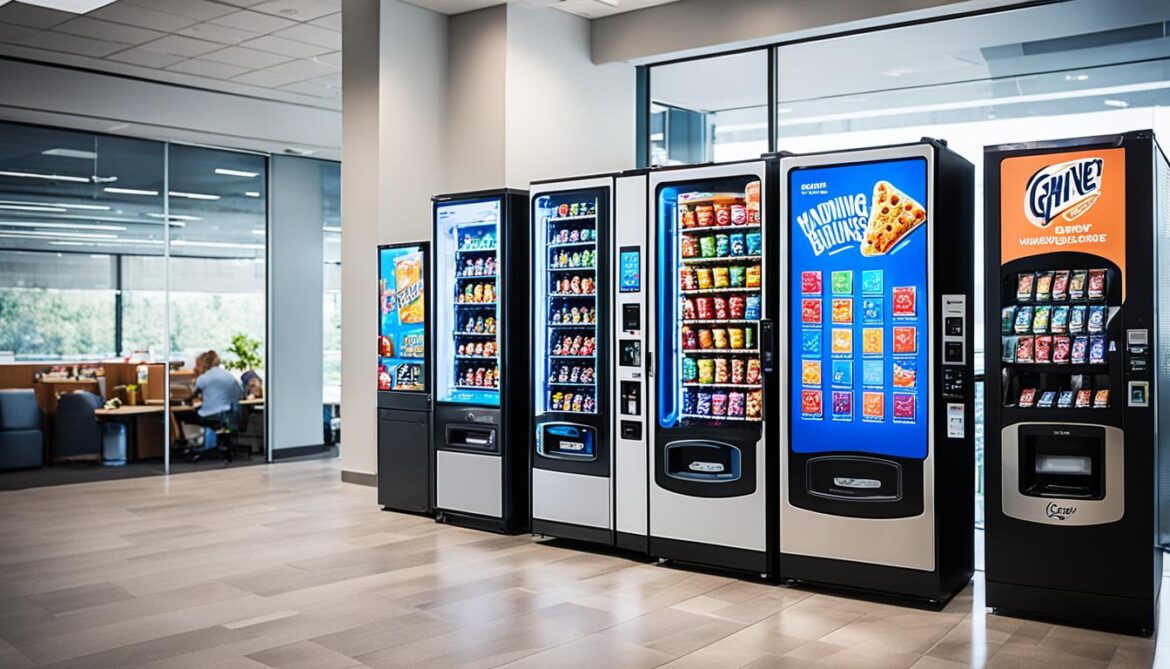Looking to start your own vending machine business? You’re in the right place. With low startup costs and minimal maintenance requirements, the vending machine industry offers a lucrative opportunity for aspiring entrepreneurs. Whether you want to sell snacks and beverages or provide unique specialty items, starting a vending machine business can be a profitable venture.
But where do you begin? In this comprehensive guide, we’ll walk you through the essential steps and considerations for launching your own vending machine business. From choosing the right business structure to finding the perfect market for your machines, we’ve got you covered. Let’s dive in and discover the secrets to success in the vending machine industry.
Key Takeaways:
- Starting a vending machine business can be a profitable venture with low startup costs and minimal maintenance requirements.
- Choosing the right market and products for your machines is crucial for success in the vending machine industry.
- Acquiring and maintaining your vending machines is an important aspect of running a successful business.
- Regularly monitoring sales, analyzing customer preferences, and making adjustments can help ensure profitability.
- By following the right steps and strategies, you can maximize your profits and achieve success in the vending machine business.
Benefits of a Vending Machine Business
Owning a vending machine business offers several advantages. It can be a manageable and successful venture for individuals with any level of experience. The cost to start a vending machine business is relatively low, as it primarily involves the purchase of machines and stocking them with products. Additionally, vending machines require minimal office space and can be maintained through repairs, restocking, and collecting money from transactions.
One of the key benefits of a vending machine business is its low startup cost. Compared to other industries, such as retail or restaurants, the investment required to start a vending machine business is significantly lower. The main expense lies in purchasing the machines and stocking them with products, making it a financially accessible option for entrepreneurs.
Furthermore, the vending machine business provides flexibility in terms of location. Unlike traditional brick-and-mortar establishments, vending machines do not require a dedicated physical space. They can be placed in high-traffic areas, such as office buildings, shopping centers, or public facilities, where potential customers are more likely to encounter them.
Another advantage of the vending machine industry is its relatively low maintenance. Once the machines are in place, regular tasks such as restocking products, collecting revenue, and performing minor repairs are required. This allows vending machine operators to focus on business growth and expansion rather than day-to-day operations.
Moreover, the vending machine business offers the opportunity to tap into various markets. Whether it’s snacks, beverages, or specialty items, vending machines can be customized to cater to specific customer preferences and demands. Operators can target different demographics and locations, adapting their offerings accordingly.
| Benefits of a Vending Machine Business | |
|---|---|
| Low startup cost | Financially accessible option |
| Flexible location | No dedicated physical space required |
| Low maintenance | Focus on business growth and expansion |
| Target different markets | Customize offerings to cater to customer preferences |
Steps for Starting a Vending Machine Business
Starting a successful vending machine business requires careful planning and execution. By following these key steps, you can set yourself up for a profitable venture in the vending machine industry.
1. Choose the Right Products
Before diving into the vending machine business, it’s essential to decide on the products you want to offer. Consider your target market and their preferences. Will you focus on snacks, beverages, healthy options, or a combination? Research the demand for different products in your chosen locations to ensure a steady stream of customers.
2. Find Prime Locations
The success of your vending machine business largely depends on the locations where you place your machines. Look for high-traffic areas like office buildings, shopping malls, hospitals, and schools. Commercial businesses with numerous employees often provide a captive audience for your products. Ensure you have permission from property owners or managers before installing your machines.
3. Select the Right Type of Machine
There are various types of vending machines available, including bulk machines, electronic machines, and mechanical machines. Each type has its advantages and suitability for different products. Consider factors such as space, product variety, and the level of automation you desire when choosing the right machine for your vending business.
4. Stock Your Machines
Once you have your products, locations, and machines sorted, it’s time to stock your vending machines. Ensure you have a reliable source for purchasing inventory, whether it’s directly from manufacturers or wholesalers. If there are regulations or requirements for healthy options in your area, be sure to include a variety of nutritious snacks and beverages in your inventory.
5. Marketing and Maintenance
Now that your machines are up and running, it’s crucial to market your business and regularly maintain the machines. Spread the word about your vending machine business through online platforms, social media, and local advertising. Stay on top of machine maintenance, including restocking, cleaning, and troubleshooting any technical issues that may arise.
| Steps | Description |
|---|---|
| 1. Choose the Right Products | Research and select products that align with your target market’s preferences. |
| 2. Find Prime Locations | Identify high-traffic areas where your vending machines will attract customers. |
| 3. Select the Right Type of Machine | Choose a vending machine type that suits your product range and business goals. |
| 4. Stock Your Machines | Ensure a reliable inventory source and comply with any regulations for healthy options. |
| 5. Marketing and Maintenance | Market your business effectively and maintain your machines to keep them running smoothly. |

Choosing the Right Market for Your Vending Machine
When it comes to starting a vending machine business, choosing the right market is essential for success. Understanding the preferences and needs of your target customers will help you tailor your offerings and maximize your profits. Consider the following tips to select the ideal market for your vending machines:
1. Identify Your Target Customers
Before diving into the vending machine industry, take the time to identify your target customers. Are you aiming your vending machines at office spaces, schools, hospitals, or universities? Each market has unique demands and preferences that you need to consider. By understanding your target customers, you can curate your product selection and create a unique selling proposition.
2. Cater to Specific Preferences
Catering to your customers’ preferences is crucial for a profitable vending machine business. For example, if you’re targeting office spaces, offer a variety of snacks and beverages that appeal to workers. Consider healthy options for schools, ensuring you comply with nutritional guidelines. By providing products that align with your customers’ preferences, you’ll increase the likelihood of repeat purchases and customer satisfaction.
3. Analyze Location Opportunities
Choosing the right location for your vending machines is key to attracting your target customers. Look for areas with high foot traffic or places where people may not have access to cooking facilities. Consider office buildings, hospitals, educational institutions, and transportation hubs as potential locations. Analyze the market demand and competition in each area to make informed decisions.
By combining a deep understanding of your target customers, tailored product offerings, and strategic locations, you will position your vending machine business for success.
| Advantages | Challenges |
|---|---|
| Earn passive income with minimal labor | Finding optimal locations |
| Low startup costs and minimal overhead | Maintaining machines and inventory |
| Flexible working hours | Competition from other vending machine operators |
| Scalable business model | Managing cash flow and securing attractive product deals |
| Wide range of product options | Staying updated with market trends and customer preferences |
By capitalizing on the opportunities and effectively managing the challenges, your vending machine business can thrive in the competitive industry.
Purchasing and Maintaining Vending Machines
When starting a vending machine business, one crucial aspect is acquiring the machines themselves. There are several options available, each with its own advantages and considerations.
You can choose to purchase new vending machines directly from manufacturers or distributors. This option provides the benefit of having brand-new, state-of-the-art machines that are reliable and come with warranties. It also allows you to customize the machines to fit your specific business needs.
If you’re on a tighter budget, buying used vending machines can be a cost-effective option. There are many reputable sellers who offer refurbished machines that have been thoroughly inspected and repaired. However, it’s important to carefully assess the condition and functionality of used machines before making a purchase.
Benefits of Purchasing an Existing Fleet
In addition to buying new or used machines individually, you may also consider purchasing an existing fleet of machines from another vending machine operator. This option can offer numerous benefits, such as:
- Immediate market presence: Acquiring an existing fleet allows you to enter the market with an established customer base and locations already in place.
- Operational efficiencies: By taking over an existing fleet, you can benefit from the previous owner’s experience and operational processes, saving you time and effort.
- Streamlined procurement: Purchasing a fleet means acquiring multiple machines all at once, simplifying the procurement process.
- Reduced competition: Depending on the terms of the acquisition, you may secure exclusive rights to operate vending machines in specific locations, minimizing competition.
Regardless of whether you choose new machines, used machines, or an existing fleet, regular maintenance is essential to keep your vending machines operating smoothly and maximize your profits. This includes routine inspections, cleaning, restocking, and performing any necessary repairs or upgrades.
By investing in regular maintenance and repairs, you can extend the lifespan of your machines, minimize downtime, and ensure a positive experience for your customers. It’s also crucial to stay updated on industry trends and technological advancements to stay competitive in the vending machine business.
Ensuring Profitability of Your Vending Machine Business
Running a successful vending machine business requires continuous efforts to ensure profitability. By closely monitoring your sales and analyzing customer preferences, you can make strategic adjustments to improve your business’s performance. One key area to focus on is the products you offer in your machines. Stay updated with the latest trends and consider introducing new items that cater to your target audience’s preferences and demands.
Pricing is another crucial aspect of maximizing your profits. Regularly evaluate your pricing strategy to ensure it remains competitive while also allowing for a sufficient profit margin. Conduct market research and assess the prices of similar products in your area to stay competitive.
Exploring new markets and locations for your machines is an effective way to expand your business and increase profitability. Identify potential high-traffic areas or untapped markets where vending machines would be in demand. Collaborate with local businesses or establishments to secure prime locations for your machines.
Regular maintenance and inspections are essential for minimizing downtime and maximizing profits. Schedule routine maintenance to keep your machines in optimal working condition. This includes cleaning, restocking, and promptly addressing any technical issues. By prioritizing operational efficiency and customer satisfaction, you can enhance the profitability of your vending machine business.
FAQ
What are the benefits of starting a vending machine business?
Starting a vending machine business offers low startup costs, minimal maintenance requirements, and can be a successful venture for individuals of any experience level. It provides a steady income with the potential for growth.
What are the steps to start a vending machine business?
First, choose the products you want to offer, find suitable locations, select the right type of machine, stock it with products, and ensure a reliable inventory source. Finally, regular maintenance and adjustments are crucial for the success of your business.
How do I choose the right market for my vending machines?
Consider the preferences and needs of your target customers. For example, if you’re targeting office spaces, focus on snacks and beverages that cater to workers’ preferences. Additionally, consider the location, such as placing food vending machines in places where people don’t have access to cooking facilities.
How do I purchase and maintain vending machines?
There are options to buy new machines, used machines, or even an existing fleet. Regular maintenance and repairs are essential to ensure proper operation and maximize profits. It’s important to do thorough research and consider factors such as cost, condition, and the reasons for selling an existing fleet.
How can I ensure profitability in my vending machine business?
To ensure profitability, monitor sales, analyze customer preferences, and make adjustments as needed. This could include changing the product offerings, adjusting pricing, or exploring new markets and locations. Regular maintenance and inspections also help minimize downtime and maximize profits.







